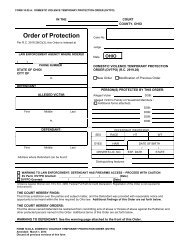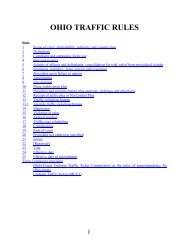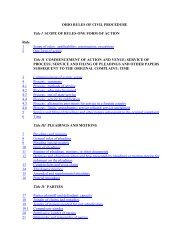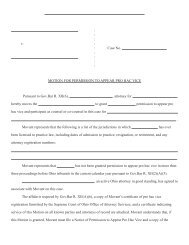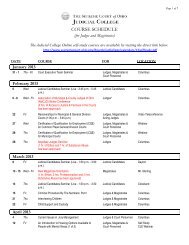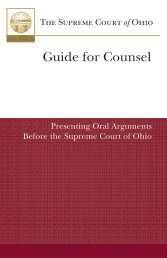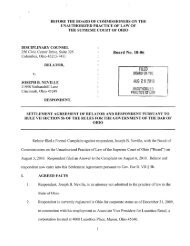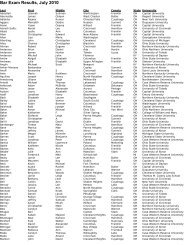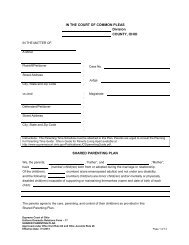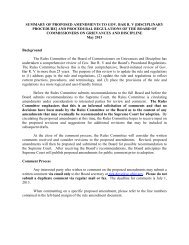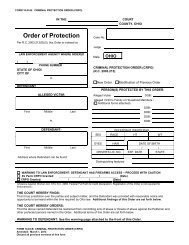disciplinary handbook: volume v - Supreme Court - State of Ohio
disciplinary handbook: volume v - Supreme Court - State of Ohio
disciplinary handbook: volume v - Supreme Court - State of Ohio
Create successful ePaper yourself
Turn your PDF publications into a flip-book with our unique Google optimized e-Paper software.
Mullaney, Brooking, and Moeves, Cincinnati Bar Assn. v.119 <strong>Ohio</strong> St.3d 412, 2008-<strong>Ohio</strong>-4541. Decided 9/16/2008.Case Summaries- 223Respondents aided in the unauthorized practice <strong>of</strong> law, improperly shared fees with non-lawyers, andfailed to seek objectives <strong>of</strong> clients by failing to assess their individual needs. Respondents worked withForeclosure Solutions, LLC. (Foreclosure), to represent Foreclosure‘s customers for a flat fee <strong>of</strong> upto $150, where the clients had no knowledge <strong>of</strong> who the lawyers were, when they were hired, or howmuch the legal fees were. Foreclosure, which is not a licensed or accredited consumer-credit-counselingagency, hired respondents to respond in court using standardized pleadings, giving Foreclosure agents,none <strong>of</strong> which were licensed to practice law in any jurisdiction, time to negotiate a settlement withmortgage lenders on behalf <strong>of</strong> its customers. Foreclosure solicited customers from court foreclosuredockets and charged them $700 to $1,100 to hire a lawyer for the customer through a limited power <strong>of</strong>attorney, design a savings plan for the customer to follow, act as the customer‘s attorney-in-fact, and usethe money in the savings to negotiate a settlement with the mortgage lenders. If negotiations failed, thetrial court granted judgment for the lenders. Foreclosure‘s agents meet the customers, collect the fees,hire the attorneys, and represent the clients in the negotiations. Respondent, Patrick F. Moeves firstagreed to represent Foreclosure‘s Kentucky customers in 2003 with his law firm, Moeves & Associates,<strong>of</strong> which respondent, Darren Joseph Mullaney was an associate. The deal continued and grew into <strong>Ohio</strong>after the formation <strong>of</strong> Brooking, Moeves, & Hollaran, P.L.L.C., (the firm), in 2004, with John S.Brooking and Moeves as principals, and Mullaney as an associate. Mullaney and Brooking are bothlicensed to practice law in <strong>Ohio</strong>, but Moeves is only admitted to practice pro hac vice in a number <strong>of</strong><strong>Ohio</strong> courts. The firm defended over 2,000 clients in 21 <strong>Ohio</strong> counties. Respondents <strong>of</strong>ten receivedmultiple client files containing the Foreclosure Work Agreement with the customer, the limited power <strong>of</strong>attorney, an intake sheet completed by a Foreclosure agent, and a copy <strong>of</strong> the foreclosure complaint atone time with a single check for all the fees. The firm‘s legal services to each client included sendingboilerplate correspondence like ―The Nuts and Bolts <strong>of</strong> <strong>Ohio</strong> Foreclosure‖ brochure that Moeves andMullaney had prepared, responding in court with standardized pleadings and other filings meant to delayjudgment creating time for Foreclosure‘s negotiations, sending copies <strong>of</strong> these filings to the clients,and if a settlement could not be negotiated, sending notice <strong>of</strong> the sale date by standardized letter tothe clients with a recommendation to contact a bankruptcy attorney. As a rule, respondents never metwith these clients to determine their particular objectives, complete financial situation, or to discoverfacts that could be defenses to foreclosures. Respondents relied on Foreclosure‘s ―savings plan‖ andfailed to determine what action, including filing for bankruptcy, was in any one particular client‘s bestinterest. Respondents knew the clients did not actually hire them or know how much <strong>of</strong> Foreclosure‘sfee went to legal fees. Respondents knew and allowed Foreclosure to continue to negotiate on behalf <strong>of</strong>these clients while the firm represented them. The board found Mullaney violated DR 2-103(C), DR 3-101(A), DR 3-102(A), DR 6-101(A)(2), and DR 7-101(A)(1) and that Brooking and Moeves violated DR2-103(C), 3-101(A), 3-102(A), 3-103(A), 6-101(A)(2), 7-101(A)(1). The <strong>Supreme</strong> <strong>Court</strong> agreed. Inaggravation, all respondents engaged in a pattern <strong>of</strong> misconduct, committed multiple <strong>of</strong>fences, and thevulnerability <strong>of</strong> the clients, people in desperate financial circumstances about to lose their home, weighsagainst them. BCGD Proc.Reg. 10(B)(1)(c), (d), and (h). In mitigation, all respondents lack a prior<strong>disciplinary</strong> record, stopped representing Foreclosure‘s customers shortly after relator filed the formalcomplaint, cooperated with the <strong>disciplinary</strong> process, and established their good character and reputation.BCGD Proc.Reg. 10(B)(2)(a), (b), (d), and (e). The board recommended that Mullaney receive a publicreprimand, Brooking be suspended for one year, stayed on conditions, and Moeves be enjoined frompractice in <strong>Ohio</strong>, pro hac vice or in any other respect for two years. The <strong>Supreme</strong> <strong>Court</strong> compared thiscase as analogous to cases where lawyers were sanctioned for providing legal services in affiliation withnon-lawyers marketing living trusts to consumers. In those cases sanctions ranged from a publicreprimand to a one year suspension, which is inline with the board‘s recommendations. The <strong>Supreme</strong><strong>Court</strong> also considered the individual circumstances surrounding each respondent: Mullaney was aninexperienced lawyer who made hard-working attempts to assist his clients, but was confined by thefirm‘s practices; Brookings was a seasoned attorney; and Moeves, also a seasoned attorney, made the



